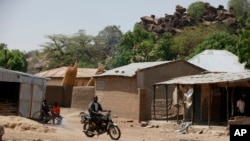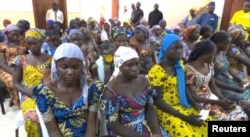Nigerian activist, Rebecca Dali has won the prestigious Sergio Vieira de Mello Foundation award for her work in re-integrating women and orphans abducted by Boko Haram militants into their home communities.
The award was presented at a ceremony Monday commemorating World Humanitarian Day (August 19) at the U.N. European headquarters in Geneva.
It is given every two years in memory of Sergio Vieira de Mello, who was killed in a terrorist attack on August 19, 2003 in Baghdad, Iraq, along with 21 others. The prize aims to draw world attention to the courageous, often unnoticed, humanitarian work of an individual, group or organization in areas of conflict.
“Rebecca Dali is a very courageous woman in a corner in Africa, in northeastern Nigeria, who is doing work under very difficult circumstances,” said Anne Willem Bijleveld, the chairman of the board of the de Mello Foundation.
He told VOA that some of the women and girls who are liberated want to return to their communities, but their communities and families often do not want them back because they have been raped, have had children, and been subjected to sexual violence by Boko Haram.
“Rebecca Dali did a tremendous job in re-establishing dialogue and reconciliation to get these girls back into their communities, to get them back where they came from and that they can continue with their life again," Bijleveld said.
Aiding widows, orphans for years
Dali was born on October 1, 1960, the same day Nigeria got its independence. She overcame extreme poverty in childhood and a rape at age six to earn a Ph.D in later years in ethics and philosophy.
She got married in 1979 to a man who, she said, “allowed me to do what I like to do.” She has six children. Her fourth, a son, was lost on August 21, 2011 in the aftermath of the Jos crisis, when clashes erupted between Muslim and Christian ethnic groups.
Dali formed her non-profit organization Center for Caring Empowerment and Peace Initiative in northern Nigeria in 1989 to aid widows and orphans caught in situations of violence, who often struggle to survive.
She has established three Livelihood Centers that teach women marketable skills, such as sewing, computers, and cosmetology. “When they graduate, we give them seed money so they can start their own business,” she said.
When the Boko Haram insurgency began in 2009, she turned her attention to the victims of this Islamist radical group. She told VOA tens of thousands of destitute widows and orphans were left behind when their men were killed.
“In our society, women are not dignified. Even if their husbands are killed, then the family usually will take away all the things that they own,” she said. “So, in the Boko Haram, they are double victimized. So, I train these widows in my Livelihood Centers.”
Dali’s husband, Reverend Samuel Dali, was president of the Church of the Brethren, which was attended by most of the 276 Chibok girls abducted by Boko Haram in April 2014.
The government has taken charge of the Chibok girls who have been released, so Dali said her group is focusing on helping the many other women and children who were abducted by Boko Haram. She said those who managed to escape have been treated as pariahs by their communities.
“They are stigmatized. People rejected them. Their husbands rejected them. The society rejected them. Their parents sometimes reject them," she said.
Dali said her organization has provided the victims with food and shelter and paid for children’s schooling. She added that the women and girls received trauma care and were encouraged to tell their distressing stories.
“Then, we go and lobby in the society among the local people, so that they will allow them to stay in the society," she said.
The award carries a cash prize of about $5,000, which Bijleveld terms "a symbolic amount." She may also win more support from the publicity.
Dali said she is heartened by the recognition she and her organization have received from the de Mello Foundation. “The award came to me as a miracle from God," she said. "So, it will urge me to do more. It is really going to help me,” she said.






